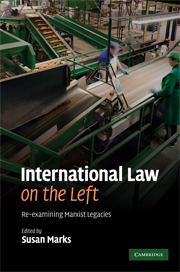Book contents
- Frontmatter
- Contents
- Contributors
- Acknowledgements
- Introduction
- 1 What should international lawyers learn from Karl Marx?
- 2 An outline of a Marxist course on public international law
- 3 The commodity-form theory of international law
- 4 Positivism versus self-determination: the contradictions of Soviet international law
- 5 Marxism and international law: perspectives for the American (twenty-first) century?
- 6 Toward a radical political economy critique of transnational economic law
- 7 Marxian insights for the human rights project
- 8 Marxian embraces (and de-couplings) in Upendra Baxi's human rights scholarship: a case study
- 9 Exploitation as an international legal concept
- Index
9 - Exploitation as an international legal concept
Published online by Cambridge University Press: 07 September 2009
- Frontmatter
- Contents
- Contributors
- Acknowledgements
- Introduction
- 1 What should international lawyers learn from Karl Marx?
- 2 An outline of a Marxist course on public international law
- 3 The commodity-form theory of international law
- 4 Positivism versus self-determination: the contradictions of Soviet international law
- 5 Marxism and international law: perspectives for the American (twenty-first) century?
- 6 Toward a radical political economy critique of transnational economic law
- 7 Marxian insights for the human rights project
- 8 Marxian embraces (and de-couplings) in Upendra Baxi's human rights scholarship: a case study
- 9 Exploitation as an international legal concept
- Index
Summary
In critical commentary on South Africa's Truth and Reconciliation Commission, Mahmood Mamdani advanced an argument that became known as the ‘beneficiary thesis’. At stake was the question of whom the truth and reconciliation process should engage. The Commission's work rested on the idea that ‘key to the injustice of apartheid [was] the relationship between perpetrators and victims’. According to Mamdani, however, the pivotal relationship should rather have been that between those who benefited and those who suffered from the system itself. For the perpetrators were a relatively small group, when compared to apartheid's many beneficaries, and so too were the perpetrators’ victims when compared to the vast majority of the population victimised by the system's indignities, hardships and oppressions on a daily basis. ‘To what extent’, Mamdani wondered, ‘does a process that ignores the aspirations of the vast majority of victims risk turning disappointment into frustration and outrage …?’ Since apartheid was fundamentally a ‘program for massive redistribution’, post-apartheid justice had to be ‘social justice … systemic justice’ and, accordingly, what was called for was systemic change.
In effect, though he does not use the term, Mamdani is speaking here of exploitation. He is saying that the TRC failed to grapple with the extent to which, and the ways in which, one section of society had prospered at the expense of another. It failed to grapple with apartheid as a system for using some people as a means for securing the advantage of others.
- Type
- Chapter
- Information
- International Law on the LeftRe-examining Marxist Legacies, pp. 281 - 308Publisher: Cambridge University PressPrint publication year: 2008
- 12
- Cited by



